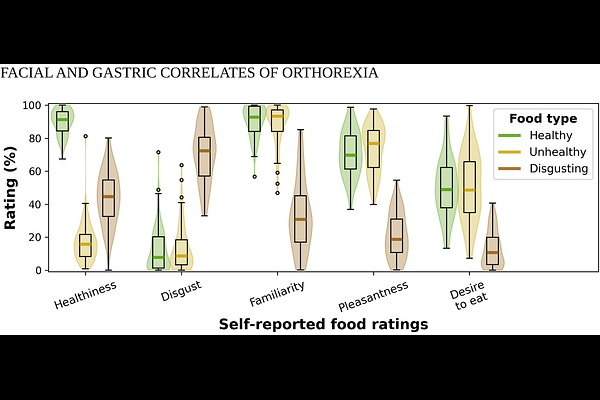Orthorexia is associated with a paradoxical appetitive gastric response to unhealthy foods

Orthorexia is associated with a paradoxical appetitive gastric response to unhealthy foods
Gumussoy, M.; Anisimova, E.; Lee, S.; Velummylum, A.; Cox, S.; Bagley, E.; Nord, C. L.; Dalmaijer, E. S.
AbstractOrthorexia involves an obsessive tendency towards \"healthy\" foods. It is a risk factor for eating disorders (anorexia nervosa and the proposed \"orthorexia nervosa\") and psychological distress, but its biological mechanism remains unknown. We hypothesised that this mechanism operates through the stomach: increased gastric power differentiates appetising from unappetising foods, vagal stimulation reduces food liking, and gastric proto-nausea can be evoked by disgust; all contributors to disordered eating. We used electrogastrography alongside high-density facial landmark tracking to gauge responses to minimally processed (\"healthy\"), highly processed (\"unhealthy\"), and culturally unaccepted (\"disgusting\") foods in a non-clinical sample (N=77). Trait orthorexia was associated with increased self-reported desire to eat healthy foods. Moreover, we found that higher orthorexia was associated with increasing disgust-related facial responses to unhealthy and disgusting foods. We then identified a relationship between food-healthiness ratings and gastric power: those who generally assigned lower healthiness ratings to foods showed higher gastric power for unhealthy than healthy foods, whereas those who expressed higher healthiness ratings showed higher gastric power for healthy over unhealthy foods. This suggests that the stomach tracks individual differences in eating preferences. Crucially, and contrary to our expectations, higher trait orthorexia was associated with a paradoxical increase in gastric power to unhealthy foods. One explanation is that higher gastric power for unhealthy foods reflects increased appetite for self-denied foods. Alternatively, orthorexia itself could be an adaptive response to exert stronger cognitive control over a pre-existing gastric appetite for unhealthy foods.